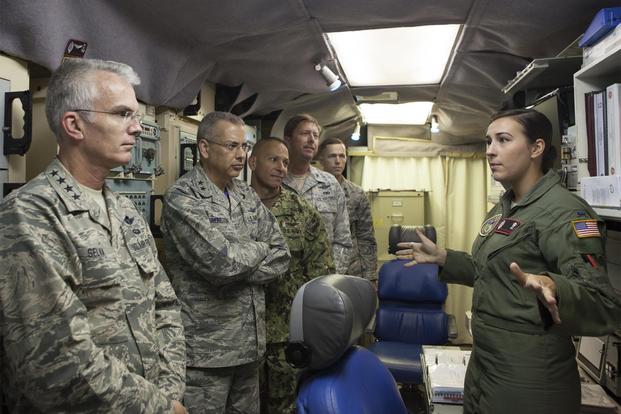No matter how ambiguous language in the upcoming Nuclear Posture Review may seem, a cyber attack on U.S. infrastructure would not warrant a nuclear strike on an adversary, the vice chairman of the Joint Chiefs of Staff said Tuesday.
"The idea that we would resort to a nuclear attack based on cyber is actually not supported by the document," Air Force Gen. Paul Selva told reporters during a roundtable discussion in Washington, D.C.
Selva also said the person who released the draft NPR document -- labeled "unclassified" and "for official use only" -- committed a crime given that it was predecisional and not given final approval by top leadership.
The Huffington Post first obtained a copy and posted the 64-page review Jan. 11.
Related content:
- Northrop, Boeing Win Initial Deal to Replace Land-Based Nuclear ICBMs
- Auditors to Air Force: Don't Be Short-Sighted on Nuclear Comms
- Lockheed, Raytheon to Develop New Nuclear Cruise Missile
"What the document does is it restates our pre-existing statement about use of nuclear weapons," Selva said.
Paraphrasing the official document -- tentatively set to be released Feb. 2 -- he said, "We reserve the right to use nuclear weapons when our national interests, our population, our infrastructure are attacked with significant consequence."
That basic wording has been in NPRs for decades, he said.
Selva clarified, "There is a view that that was too ambiguous, and so [what] we went on to say was, 'This will include but is not limited to non-nuclear strategic strikes on our population, our infrastructure that are our allies and partners, or the command and control systems and indications of warning that are important to our detection of an attack.'
"We never said cyber," he said, adding the word "cyber" is used fewer than 10 times throughout the review.
Responding to critics and nuclear experts who worry that wording allows the U.S. to use low-yielding nuclear weapons in response to a cyber attack, Selva said, "That's just fundamentally not true."
He stressed the NPR is largely consistent with the Defense Department's thinking on nuclear deterrence going back 70 years, reaffirming "the requirement for a [nuclear] triad" and surrounding procedures.
But "context matters," Selva said.
"If the attack has strategic consequence, if it kills a lot of people, if it interrupts our nuclear command and control and indications and warning systems -- these are all hypotheticals -- we … reserve the right to respond. Which is precisely what we said in [the] 2010 [NPR]. All we did is add one sentence [for clarity]."
Low-yield Nukes
Amid recent news stories surrounding a push to build more low-yield nuclear weapons, dubbed "mini-nukes," which the vice chairman himself has backed, Selva said the concept isn't new to the U.S.
Weapons such as the B61 nuclear gravity bomb and the W80 warhead designed for cruise missiles have been "in the inventory for decades," he said.
"Having low-yield weapons does not in and of itself lower the threshold for use of nuclear weapons," Selva said.
The general said that the variety of options the military has to offer is not only a deterrent against adversaries, it also aids in identifying additional opponents who harbor similar technologies.
"So [we are] not lowering the threshold of us entering the fight, [but] raising the threshold of our potential adversaries -- chief among them the Russians, who have thousands of low-yield nuclear weapons, and that is really key to the declaratory policy," he said.
Following the release of the NPR, Selva said the Ballistic Missile Defense Review -- strategies to strengthen U.S. missile defense capabilities, also last updated in 2010 -- will be released a few weeks later.
-- Oriana Pawlyk can be reached at oriana.pawlyk@military.com. Follow her on Twitter at @Oriana0214.









